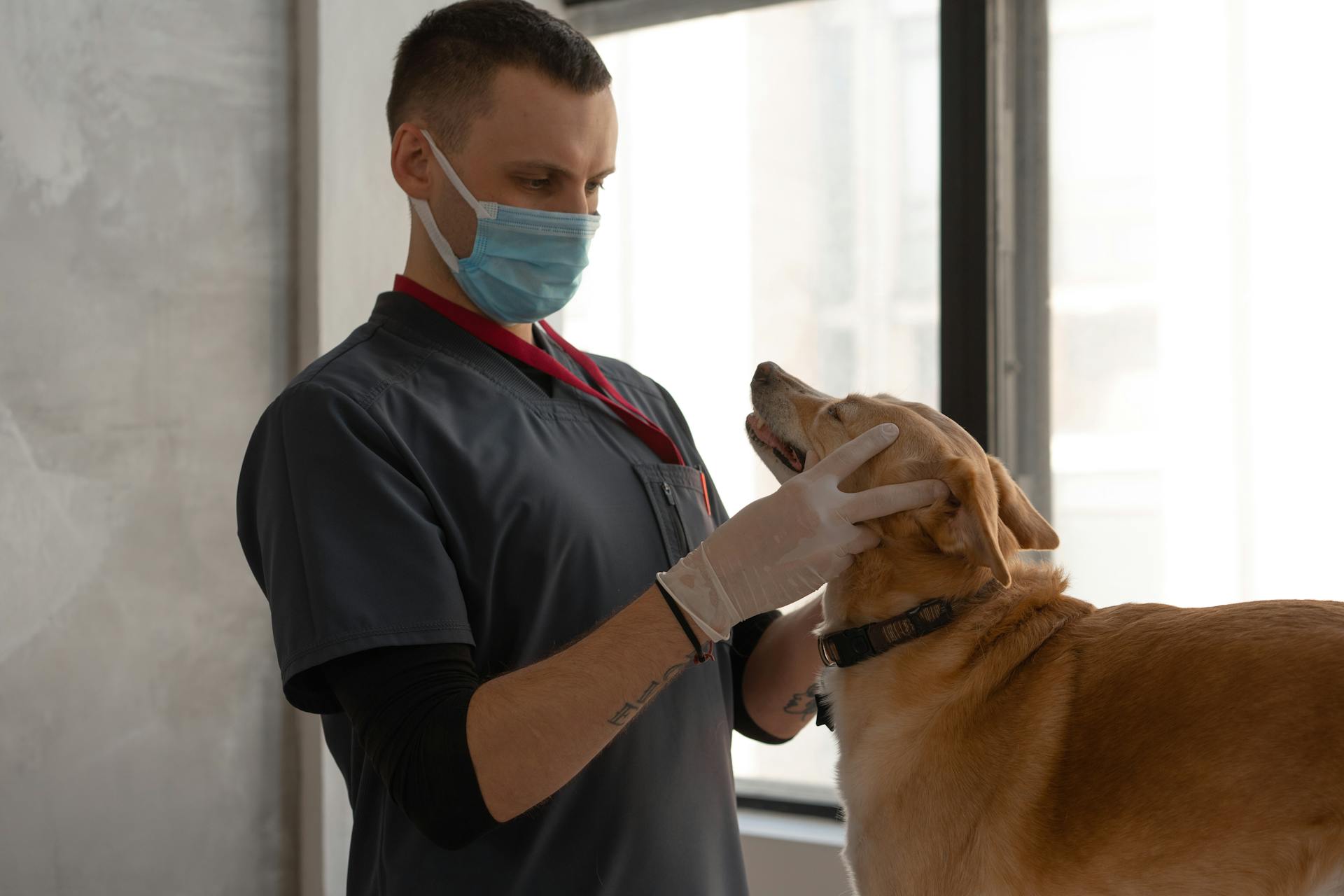
Dog blood work is an essential tool for veterinarians to diagnose and monitor various health conditions in our furry friends. It's a non-invasive and relatively quick procedure that can provide a wealth of information about a dog's overall health.
A typical dog blood work panel can include a variety of tests, such as a complete blood count (CBC) and a serum biochemistry profile. This can help identify issues like anemia, infections, and organ damage.
A CBC can reveal important information about a dog's red and white blood cell count, which can indicate conditions like anemia or infections. For example, a low red blood cell count can indicate anemia, which can be caused by a range of factors including chronic disease, blood loss, or bone marrow failure.
Regular blood work can help identify health issues early on, allowing for prompt treatment and a better prognosis.
For your interest: Embark Breed + Health Dog Dna Test
Understanding Dog Blood Work
A blood test can give you valuable insights into your senior dog's health and wellness. By checking different components of the blood, such as red and white blood cells, biochemistry, and immunology, you can understand your dog's needs better and recognize potential issues early on.
Senior dogs are most at risk of health issues, so it's essential to get them tested for a biochemistry profile, complete blood count, thyroid hormone testing, and urinalysis. A heartworm test is also crucial for senior dogs.
A comprehensive blood panel, which may include additional components like a heart enzyme test, can help identify potential health issues in senior dogs. Your veterinarian will recommend the specific tests based on your dog's age and health status.
Here's an interesting read: Havanese Skin Issues
What Do Tests Check For?
A blood test for your senior dog can be a powerful tool in understanding their overall health and catching any potential issues early on. A comprehensive blood panel, which is often recommended for senior dogs, typically includes a biochemistry profile, complete blood count, thyroid hormone testing, and urinalysis.
A heartworm test is also essential for senior dogs, as they are more susceptible to heartworm disease. Your veterinarian may also choose to include additional tests, such as a heart enzyme check, depending on your dog's specific needs and the clinic's protocols.
Here are some common components of blood tests for older dogs:
- Biochemistry profile
- Complete blood count
- Thyroid hormone testing
- Urinalysis
- Heartworm test
These tests can help identify a range of health issues, from kidney disease to anemia, and can provide a baseline for your dog's normal functions and values. By understanding what your veterinarian is looking for in a blood test, you can provide valuable information to help them make an accurate diagnosis and develop an effective treatment plan.
Worth a look: Skin Care for Dogs with Allergies
Electrolytes
Electrolytes play a crucial role in maintaining your dog's acid-base balance, which is essential for their overall health.
Electrolytes like sodium, potassium, and chloride are key components of blood, and their levels can help veterinarians understand what's going on inside your dog's body.
Disturbances in electrolyte levels can indicate underlying processes, giving veterinarians valuable information to diagnose and treat conditions.
Electrolytes help regulate the balance of fluids in your dog's body, which is vital for their hydration and overall well-being.
Sodium, potassium, and chloride are the most important electrolytes in your dog's blood, and their levels can be affected by various factors, including diet, environment, and health conditions.
A unique perspective: Dog Health News
Preparation and Collection
To prepare for your dog's blood work, you'll need to collect various samples. Blood is collected from the vein, either from the neck or arm, depending on your pet's comfort level. A jugular blood draw is common, but your veterinarian may choose the arm instead.
For a fecal sample, you'll need to collect a container from the veterinarian's office and bring it home for your dog to deposit their stool into it. Once you have the sample, bring it back to the office. If your dog has skin conditions, an impression smear will be taken by pushing a slide onto the affected areas.
Your veterinarian will likely want to examine your dog before performing the lab test, especially if it's been over a year since their last visit. This allows them to visually assess your dog's overall health, including their vitals and behavior.
Worth a look: How to Collect Female Dog Urine Sample
Pre-Test Exam for Dog
Before your dog undergoes a lab test, it's essential to ensure they're in good health. We generally like to see your pet within the year to physically examine them and assess their overall behavior.
If it's been beyond a year, we want to see your dog to check their vitals and identify any potential health issues. Visually seeing your pet helps us in the exam and can also reveal any conditions you may not notice or understand.
A pre-test exam is crucial to get an accurate reading of your dog's health. This exam will help us determine the best course of action for the lab test and ensure your dog's safety during the procedure.
During the exam, we'll assess your dog's overall health, including their behavior, vitals, and physical condition. This will give us a baseline to compare with the lab test results and help us identify any potential health issues.
Here are some common components we'll check during a pre-test exam for your dog:
- Biochemistry profile
- Complete blood count (CBC)
- Thyroid hormone testing
- Urinalysis
- Heartworm test (if necessary)
By performing a pre-test exam, we can ensure your dog is healthy enough for the lab test and provide you with a clear understanding of their health status. This will also help us identify any potential health issues early on, allowing us to provide the best possible care for your dog.
For more insights, see: Certificate of Good Health Dog
Pet Sample Collection
Blood samples are collected from the vein, typically from the neck or arm, depending on the pet's comfort level.
We usually send you home with a container for fecal collection, which you'll need to fill with your pet's fecal matter before bringing it back to us.
A jugular blood draw is used for blood collection, which is a common and comfortable procedure for pets.
If your pet has skin conditions, we'll take an impression smear by pushing a slide onto their lesions.
Urine collection can be done through a free catch or cystocentesis, a sterile procedure where a needle is inserted into the bladder to collect a sample.
The cystocentesis method is very safe and well-tolerated by pets, and it gives us a clear sample to test for bacteria or other issues.
You'll typically get to take the fecal container home with you, and once your pet produces fecal matter, you can bring it back to us for testing.
Expand your knowledge: Dog Hearing Test at Home
Importance and Benefits
Routine blood tests for your dog are worth it because they can help spot potential health issues, which can prevent conditions from getting worse or allow for earlier maintenance.
They're very effective in giving us a lot of information about what's going on internally in our dog's body.
Dog blood tests can help a vet figure out what's wrong with your pet when they're not feeling well, so you can get them feeling better sooner.
The labs and materials used in dog blood tests are very sensitive and provide a lot of information.
Recommended read: How Does Dog Dna Test Work
Cost
The cost of dog blood work can vary, but it's essential to understand what you're getting into. A routine full blood panel for a dog can cost anywhere from $100 to $200.
Factors like the type of test needed, frequency, and location can affect the total cost. For example, special blood tests may cost more than a routine blood panel, and monitoring a condition or your dog's age may increase the frequency of tests.
Here's an interesting read: Dog Dental Work Cost
If your pup has routine blood work coming up, ask your vet for a breakdown of the costs so you can be financially prepared. It may also be a good idea to ask what their prices are for other blood tests, so you can build an emergency fund if your dog gets sick or injured.
Additional costs you may encounter include more blood work, X-rays, ultrasounds, a urinalysis, and more, depending on the results of the initial blood tests. These can add up quickly, so it's crucial to factor them into your budget.
Pet insurance can help cover some of these costs. MetLife Pet Insurance, for instance, provides coverage that can help with the costs of maintaining your dog's health, including blood work for diagnostic purposes.
Frequently Asked Questions
What shows infection in dog blood work?
Elevated levels of neutrophils (NEU), lymphocytes (LYM), and monocytes (MONO) in a dog's blood work may indicate an infection or cancer. This can be a sign that your dog's body is fighting off an underlying issue.
What is a full blood panel test for dogs?
A full blood panel test for dogs, also known as a Complete Blood Count (CBC), evaluates various aspects of a dog's health, including hydration, anemia, infection, and immune system response. This essential test helps identify underlying issues in dogs showing symptoms like fever, vomiting, or weakness.
What are the screening tests for dogs?
Dogs undergo a series of screening tests including a physical exam, urine testing, and blood tests to check for common health issues such as kidney disease, liver disease, and diabetes. These tests help identify potential health problems early on, allowing for prompt treatment and a better quality of life for your furry friend.
What is a Chem 25 blood test for dogs?
A Chem 25 blood test for dogs provides a comprehensive overview of the body's functions, including liver, kidney, and pancreas health, as well as electrolyte levels. This test can help identify potential health issues and inform veterinary care.
Sources
- https://www.vetwest.com.au/pet-library/blood-tests-understanding-your-pets-blood-work/
- https://www.bocaparkanimalhospital.com/services/dogs/laboratory-blood-tests
- https://veterinarygeneral.com/2018/05/17/understanding-your-pets-blood-work/
- https://www.metlifepetinsurance.com/blog/pet-health/dog-blood-work-cost/
- https://www.seniordogrevolution.com/senior-dog-blood-panel-what-do-they-check-for-and-cost/
Featured Images: pexels.com


